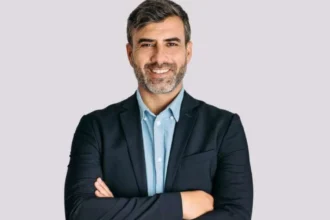What we know about Shamsud Din Jabber, the suspect from New Orleans attack
Driving a pickup truck into a throng on Bourbon Street on January 1, 2025, a Texas man named Shamsud Din Jabber, 42, murdered 14 people and seriously injured many more.…
Headlines
Iowa Wrestling’s Yonger Bastida To Miss Remainder Of Season Due To Injury
It's a huge blow for the Iowa wrestling team as standout heavyweight Yonger Bastida will miss the remainder of the…
Jude Bellingham and Mbappé to Real Madrid Propel Club to top Merchandise Sales
Mbappé to Real Madrid elevates the club to the top of product sales with two entirely different approaches: Mbappé’s No.…
Dana Grady, The Woman Who Completes Joe Flacco
The wife of Joe Flacco, the ex NFL quarterback, is named Dana Grady. That is where he and Grady met…
Jagdish Vishwakarma’s One-Legged Nataraj Pose Steals Spotlight at National Games 2025
Dehradun, Uttarakhand – Weightlifter Jagdish Vishwakarma of the Services team delivered a jaw-dropping performance at the National Games 2025, clinching gold…
Understanding Johns Hopkins Maya Trial
Johns Hopkins Maya trial is a lawsuit of medical negligence. It was filed by the…
The Carlee Russell Controversy
The nation was captivated by the perplexing tale of Carlee Russell, an Alabama woman whose…
Trial Date Set For Naresh Bhatt In Mamta Kafle Bhatt Murder Case
Naresh Bhatt is to stand trial for the alleged murder of his wife, Mamta Kafle…
Brief History of Wade Wilson Crimes
Wade Wilson crimes caused him to be called as the "Deadpool Killer,". He was found…
Qantas apologises after R-rated movie played to passengers on Sydney to Tokyo flight
Qantas has apologised to passengers on a flight from Sydney to Japan after an R-rated film was played to the…
Rohit Sharma’s wife Ritika breaks internet with post for Rahul Dravid
Rohit Sharma's wife, Ritika Sajdeh, came up with an emotional post for former India head coach Rahul Dravid, whose tenure…
Disney Adventure cruise ship to set sail from Singapore in 2025
It is not often that one gets to sail with Captain Mickey Mouse and his entourage of entertainers, all from…
Unraveling the Disturbing World of ‘Quiero Agua’ Videos: A Troubling Online Phenomenon
In the vast landscape of the internet, certain online trends can capture attention for all the wrong reasons. One such…
Why Outdoor Entertaining Starts with a Well-Kept Lawn
A thriving lawn is the foundation of a great outdoor gathering. Whether it’s a family cookout, an evening under the…
6 JHU Essays That Worked – 2024-2025 Prompts Included
Supplemental essays are an important part of the admissions process for Johns Hopkins University (JHU).…
The Centerpieces at Wedding Receptions NYT Puzzle
Once, the clue of the New York Times Mini Crossword was “Centerpieces at Wedding Receptions…
World
Best Software Outsourcing Companies in USA
Understanding software rethinking is fundamental for associations wanting to stay vicious in the current high…
What is Adobe Experience Manager, and What are the Benefits of AEM?
In today's digital age, delivering a seamless and engaging customer experience is crucial for businesses…
The Cost Structure of PMP Certification
The cost associated with PMP certification includes such expenses that a candidate should bear while preparing for the certification. Assessment…
Top Writers
-
Check out Tags:
- News
- Business
- Celebrity
- Health
- Crime
- Home Decor
- Trending
- Relationship
Most Read This Week
How Much Is Lemuel Plummer Net Worth?
Lemuel Plummer net worth is about $50 million in 2024, mainly from being the founder and CEO of Zeus Network, a streaming service known for its unscripted reality shows and…
How Much Is Lemuel Plummer Net Worth?
Lemuel Plummer net worth is about $50 million in 2024, mainly from being the founder…
Travis Scott and Michael Rubin Launch Exclusive Merchandise Shop at the University of Texas at Austin
Travis Scott, the renowned rapper from Texas, and the famous rapper from Texas, Michael Rubin,…
Insights into Romain Dauriac’s Personal and Professional Life
The story of Romain Dauriac shows how difficult it can be to manage both private…
Your Trusted Source for Accurate and Timely Updates!
How Much is Richard Montanez Net Worth Now?
Richard Montanez's path is as hot as Flamin' Hot Cheetos, which he is credited with introducing. While the actual sum…
Eugenio Pallisco Michigan is Unsung Hero
Eugenio Pallisco made a big difference in Michigan. He brought new ideas for buildings, helped the economy grow, and gave…
Insider’s Look at Sunny Balwani Net Worth
It is fascinating to know about Sunny Balwani Net Worth. The financial story in the case of Sunny Balwani, a…
Kase Abusharkh’s Professional Odyssey
Kase Abusharkh, the driving force behind The Kase Group, stands out prominently in the spheres of business and entrepreneurship. Kase,…
The Love Story of Lakiha Spicer and Mike Tyson
Love between Lakiha Spicer and Mike Tyson is considered as one of the strongest and closest. They first crossed paths in 2004 when Kiki was 18 years old, during a…
How Riko Shibata Stole Nicolas Cage’s Heart Over FaceTime
Riko Shibata and Nicolas Cage started dating after they met in Japan shooting a film…
The Unlikely Josh Allen Hailee Steinfeld Romance
The love story of Josh Allen Hailee Steinfeld has drawn attention from both fans and…
Bill Belichick Girlfriend Responds To Snoop Dogg’s Roast And It Says A Lot
Belichick and girlfriend Jordon Hudson fuel their part in a public interest surrounding their age…
The Beginning Of Miley Cyrus Boyfriend Love Story With Her
Miley Cyrus Boyfriend met her and started dating in late 2021 when Cyrus proposed that…
April 2, 2025 Mississippi Tornado: A Day of Destruction, Courage, and Coming Together
A Day No One Will Forget The morning of April 2, 2025, in Mississippi was like any other spring day.…
Hamas Ceasefire Explained: Who Wins, Who Loses?
After more than a year of conflict, Israel and Hamas decided on January 19, 2025, to call off hostilities. This…
What Trump Abortion Policies Mean for Women’s Healthcare in 2025
When Donald Trump came back to the White House in 2025, he quickly put in place new rules, especially when…
Convicted Teen Killer Aiden Fucci Moved to Another Prison — But Why?
Aiden Fucci, the Florida adolescent murderer, was moved from Suwannee Correctional Institution to Cross City Correctional Institution in Dixie County…
Did Bruce Willis die? Family confirms dementia diagnosis in emotional statement
Did Bruce Willis die? Recently there have been concerns over the welfare of popular actor Bruce Willis. In a bid…
Recent News
The Case of Tyler Doyle
Tyler Dohle, a 23-year-old dunk hunter, drew public attention after he was reported missing on the night of January 26, 2023, in South Carolina. His disappearance has caused widespread concern,…
Hamas Ceasefire Explained: Who Wins, Who Loses?
After more than a year of conflict, Israel and Hamas decided on January 19, 2025, to call off hostilities. This was supposed to be a breath of fresh air, after…
What Trump Abortion Policies Mean for Women’s Healthcare in 2025
When Donald Trump came back to the White House in 2025, he quickly put in place new rules, especially when it comes to abortion. Trump has always been very clear…
Convicted Teen Killer Aiden Fucci Moved to Another Prison — But Why?
Aiden Fucci, the Florida adolescent murderer, was moved from Suwannee Correctional Institution to Cross City Correctional Institution in Dixie County during January 2025. Suwannee Correctional Institution officials say it did…
Did Bruce Willis die? Family confirms dementia diagnosis in emotional statement
Did Bruce Willis die? Recently there have been concerns over the welfare of popular actor Bruce Willis. In a bid to clear any rumors that later came out, Bruce Willis…





























